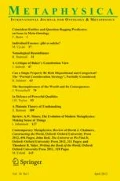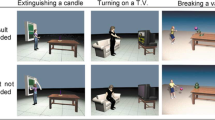Abstract
Tropes, as distinguished from other possible kinds of entities such as universals, states of affairs, events and bare particulars, are best-suited to play the role of causal relata.
Similar content being viewed by others
Notes
For example, Cartwright (1989) maintains that substances have irreducible capacities to make changes in the world because of their nature.
For the distinction of the event/state of affairs that I am roughly introducing here, see J. Bennett (1988).
To speak of ‘particular’ properties instead of ‘individual’ properties could be misleading. A particular is something that parts a whole. For instance, each particular man parts the whole of the ‘dividual’ manhood thus being man. But one could also admit that there are individuals without accepting this account for their individuality. Given that ‘individual’ makes reference to what is not divisible in the sense that a dividual is, it seems more appropriate to speak of individual properties. Russell is, of course, trying to define the essence of individuals and universals. The former he takes to be concrete things, the latter transcendental properties and relations.
A more complex way of saying what I really mean here, but that takes into account Platonic universals as well, would be something like this: universal properties are to many. However, this way of speaking would obscure the discussion. A further possibility is to say that individual properties, unlike universals, are not capable of multiple instantiation; but now the problem is that individual properties do not properly “instantiate”. Moreover, this would imply a relation between universals and individuals accounting for their distinction, which seems unnecessary and maybe a petitio principii.
For instance, Whittle (2003: 376) writes that ‘tropes as sui generis property instances, such as ‘the redness of this poppy’ or ‘the love of Bob for Katy’ (…) are intrinsic to the entities which have them’ (original italics).
In a sense, the point is that identity conditions for substances or events are harder to determine/specify than identity conditions for properties. After all, the former do need properties.
‘Harmless’ because the fact that they belong to their bearers necessarily still leaves open the possibility that they are not essential properties of them.
The idea that individual properties are ontologically distinct because distinct substances individuate them can be distinguished from the idea that individual properties are dependent existents: the second can hold even if the first does not. Consider the individual brown that happens to belong to Aaron’s staff. Does it need some kind of ontological support, such as a substance (a staff or a tree), to subsist? One can answer this question in the affirmative and at the same time deny that the staff or the tree provide the conditions of individuation for the property. John Marenbon (1997) has argued that this was Abelard’s view: ‘Accidents do not individuate substances, nor are forms individuated by the substances to which they are attached; indeed, any given form might have been attached to a different particular substance from that to which it is in fact attached. (...) [T]he particular whiteness which makes this body white might have in fact made a different body white, although once in this body it cannot be in another’ (p. 120; my italics). Moreover, even if we accept, against Abelard’s last condition, that individual properties can be actually transferred, they could still need substances (or events) to subsist: properties would be transferred from substance to substance without intermediaries other than substances.
I think that his transference theory of causation is mistaken. See Garcia-Encinas (2004).
Molnar (2003: 43) unfairly compares the view that properties could exist without bearers with Platonism. This is clearly unwarranted because it implies that individual properties without bearers would exist in something like a Platonic realm, which is not the case: whether individual properties are beings in our own realm does not depend on whether or not they have bearers.
States of affairs are irreducible complex structures that consist minimally of the following: a particular entity (a substance, an event or a bare particular), a property and a special relation between these terms. There is no ad hoc reason why the property in question should be universal.
See, for instance, Ehring (2002) where he argues that a trope’s nature is determined by its membership in a natural class, where the class also includes possibilia.
A terminological note could be useful here. I will use and have been using ‘different’ for something like ‘discernible’, where the latter does not have epistemological implications: two entities are different if they have different (natural) properties. ‘Distinct’ is like ‘other’ or ‘numerically other’. The idea is to propose a discourse that does not exclude the possibility that there are indiscernible (non-different) but distinct (other) entities. In other words, the idea is to propose a discourse where Bradley’s dictum that ‘distinction implies difference’ could be subject to consideration. I also think that the dictum is false (see note 22). But this should not matter—yet.
I think that there is nothing obscure or suspicious in the idea that effects are differences made by causes or in the idea that causes are difference makers, that is, effect makers. They are difference makers in the sense, not only that the world would have been different had they not occurred, but also in the sense that they are makers of being.
Please keep in mind that the cause of a given effect is not being considered as part of the relevant properties of the effect. Otherwise, the argument could seem suspect. The idea is that a different effect is another effect; but this leaves open the possibility that the same effect is caused by different causes, for instance. I failed to see this in Garcia-Encinas (2003).
Ned Hall (2000) proposes to lay the blame on transitivity. However, if I am right and causes and effects are (sums of) properties, this drastic movement is also unnecessary.
Again, non-trivial means that we should not take non-natural properties into account.
To work under the possibility that the principle is false seems reasonable enough. But I think I can also offer a reason why it is false. To conceive of something as distinct, as a numerically other entity, is not to think of it as being in any relation of agreement or difference with any other thing. And a reason must be given to assume otherwise; a reason must be given why, as Johnson (1964: 22) would put it, ‘otherness presupposes comparison’.
As Armstrong does, this difficulty is usually written in terms of objects or substances (see Moreland 1985: 59), but it can be safely applied to other sorts of possible indiscernibles, such as causal relata.
References
Abelard, P. Logica Ingredientibus in B. Geyer (ed.) (1919–1933) Peter Abaelard’s Philosophische Schriften Aschendorff.
Aristotle Aristotle´s Categories and De Interpretatione J.L. Ackrill (trans.) (1963) Oxford: Claredon Press.
Armstrong, D.M. (1968) A Materialist Theory of Mind London: Routledge.
Armstrong, D.M. (1978) Nominalism and Realism vol. I: Universals and Scientific Realism Cambridge: Cambridge University Press.
Armstrong, D.M. (1989) Universals: an Opinionated Introduction Colorado: Westview.
Armstrong, D.M. (1997) A World of States of Affairs Cambridge: Cambridge University Press.
Bennett, J. (1988) Events and Their Names Indianapolis: Hackett Publishing Company.
Boethius Second Commentary on Porphyry’s Isagoge, vol. 64. In The Patrologia Latina Database Jacques-Paul Migne’s (ed.) Patrologia Latina 1844 & 1855. http://pld.chadwyck.co.uk/.
Campbell, K. (1990) Abstract Particulars Oxford: Blackwell.
Cartwright, N. (1989) Nature’s Capacities and their Measurement Oxford: Oxford University Press.
Davidson, D. (1967) ‘Causal Relations’ The Journal of Philosophy, 64:691–703.
Davidson, D. (1969) ‘The Individuation of Events’ in his (1980) Essays on Actions and Events Oxford: Clarendon Press, pp. 163–180.
Denby, D. A. (2001) ‘Determinable Nominalism’ Philosophical Studies 102: 297–327.
Ehring, D. (1997) Causation and Persistence New York: Oxford University Press.
Ehring D. (2002) ‘The Causal Argument against Natural Class Trope Nominalism’ Philosophical Studies 107: 179–190.
Garcia-Encinas, M.J. (2003) ‘A Posteriori Necessity in Singular Causation and the Humean Argument’ Dialectica 57(1):41-55.
Garcia-Encinas, M.J. (2004) ‘Transference, or Identity Theories of Causation?’ Theoria 19(49):31-48.
Hall, N. (2000) ‘Causation and the Price of Transitivity’ The Journal of Philosophy 97(4): 198–222.
Johnson, W. (1964) Logic, part I Dover: New York (1st ed. 1921).
Kim, J. (1973) ‘Causation, Nomic Subsumption and the Concept of Event’ The Journal of Philosophy 70: 217-236.
Lewis, D. (1983) ‘New Work for a Theory of Universals’ Reprinted in his (1999) Papers in Metaphysics and Epistemology Cambridge: Cambridge University Press, pp. 8-55.
Lewis, D. (1986) ‘Postscripts to ‘Causation’’ in his Philosophical Papers vol. II Oxford: Blackwell, pp. 172–213.
Lewis, D. (1997) ‘Finkish Dispositions’ Philosophical Quarterly 47:143-158.
Loux, M. (1998) Metaphysics: a Contemporary Introduction London: Routledge.
Marenbon, J. (1997) The Philosophy of Peter Abelard Cambridge: Cambridge University Press.
Mertz, D.W. (1996) Moderate Realism and its Logic New Haven: Yale University Press.
Molnar, G. (2003) Powers Oxford: Oxford University Press.
Moreland, J.P. (1985) Universals, Qualities, and Quality-Instances Boston: University Press of America
Mulligan, K., Simons, P. & Smith, B. (1984) ‘Truth-Makers’ Philosophy and Phenomenological Research 44: 287–322.
Paul, L.A. (2000) ‘Aspect Causation’ The Journal of Philosophy 97(4): 235–256.
Quine, W.O. (1953) ‘On What There is’ in his From a Logical Point of View Cambridge: Harvard University Press, pp. 1–19.
Russell, B. (1912) ‘The World of Universals’ in his The Problems of Philosophy. Oxford: Clarendon Press, pp. 52–57.
Schaffer, J. (2001) ‘The Individuation of Tropes’. Australasian Journal of Philosophy 79(2): 247–257.
Shoemaker, S. (1980) ‘Causality and Properties’ in P. Inwagen (ed.) (1980) Time and Cause Dordrecht Reidel, pp. 109–135.
Whittle, A. (2003) ‘Singularism’ Proceedings of the Aristotelian Society 103: 371–379.
Acknowledgements
This paper was written within research project HUM2007-63797 MEC. I want to thank an anonymous referee for his/her comments on a previous version.
Author information
Authors and Affiliations
Corresponding author
About this article
Cite this article
Garcia-Encinas, M.J. Tropes for Causation. Int Ontology Metaphysics 10, 157–174 (2009). https://doi.org/10.1007/s12133-009-0047-1
Received:
Revised:
Accepted:
Published:
Issue Date:
DOI: https://doi.org/10.1007/s12133-009-0047-1




